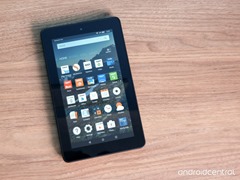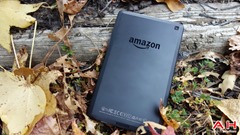 If you travel a lot or have to deal with waiting rooms on a regular basis, you (sadly) can’t bring your entire personal library with you.
If you travel a lot or have to deal with waiting rooms on a regular basis, you (sadly) can’t bring your entire personal library with you.
What you can bring is your e-reader, and out of those, Amazon’s Fire tablet is the cream of the crop.
You can take your entire digital collection with you and find other benefits such as magazines and newspapers to fill those five minute gaps, but what about the risks of using such a device?
Hackers and cybercriminals will attack just about any device that they can get data from, and with the Internet capabilities of the Fire and the personal data (even simple account information) kept on most devices, you can expect yourself to be a target.
It isn’t that the problems can’t be managed. Rather, it is that you should know the risks so you can plan on how to use your device accordingly.
Here are a few things you need to know about the Fire and its unique security risks:
What security features does the Fire have?
If you compare Fires to other major devices on the market that act as tablets or computers, not all that many.
Fortunately, you don’t have to deal with too many viruses and other malicious programs that target Kindles given the higher profitability of other devices, but those devices are better prepared. The Fire has some barebones features concerning security, and it might behoove you to get a security app if you browse the internet often.
That said, if you don’t plan on using the Fire for anything other than reading your e-books, you don’t have too much to worry about. Simply disable your WiFi, and you will be all right for the most part, so long as the Fire stays safely in your hands. You will want to enable strong passwords whenever you can on your device and make sure that you don’t have yourself logged into sensitive accounts.
What if your Fire does get lost or stolen?
What if your Fire does wind up leaving your hands? Perhaps you forget it on the subway and it’s never seen again? Of course you have to deal with the loss of losing the device, and your books and subscriptions are more than likely tied to your accounts so on that front you won’t lose anything. Your information, on the other hand, will be at considerable risk. Try to make sure you know where it is at all times.
In the event that your Fire gets stolen, you will want to change the passwords to any account you’ve ever used on your Fire immediately. Even if you’ve put verification measures on your device (and you absolutely need to) they won’t last too long when a concerted effort is made by cybercriminals. Once they get into your device, they could potentially steal your accounts and perform identity theft, which is a nightmare to combat.
Public networks
The largest hidden danger that you have to worry about on your Fire is that of hackers on public networks, against which Fires (and most other devices) have no default defense. On these networks (such as those you find at cafes and government buildings), hackers will often lurk and, with a simple setup, intercept any data you send or receive over the network. This means any account you use on your Kindle Fire (including your Amazon account) is compromised, and the hackers will work quickly to take advantage of the info.
The best way you can defend yourself on these networks is to use a Virtual Private Network (VPN), which is a service that allows you to connect your device to an offsite secure server with an encrypted connection. This connection will protect you on any network and let absolutely no one take a look at your browsing habits. You can even use one in conjunction with your Fire to watch Netflix anywhere in the world you want (in the rare event you get tired of reading), as it can make you appear as though you are browsing anywhere you want—though since Netflix has decided to crack down on such services, it remains to be seen whether this will continue to be possible in the longer term.
Browsing online
 Fires, like nearly any tablet, have a web browser that you can use to check the news or perform simple online tasks. Perhaps you use it to check up on your favorite blog. As for whether it is safe, that depends mostly on you and your habits. To remain safe on your device, you will want to do the following:
Fires, like nearly any tablet, have a web browser that you can use to check the news or perform simple online tasks. Perhaps you use it to check up on your favorite blog. As for whether it is safe, that depends mostly on you and your habits. To remain safe on your device, you will want to do the following:
- Be careful of the websites you visit. Make sure that you know what you click on and only use websites you trust. Malware does exist for e-readers, and it is extremely difficult to remove.
- Beware of scams and other schemes meant to take your personal information. The internet doesn’t change no matter what device you use it on, and scams keep appearing online because they work often enough. Remember that many things are in fact too good to be true.
- Don’t give away too much personal information online. Giving away your email one minute can lead to a load of problems the next minute. Don’t be afraid to remain anonymous and put a high value on your privacy.
Kindles have evolved from simple reading devices in their original incarnation to a tablet that can help us live our lives. Yet in that transition the tablet gained several vulnerabilities that we should be wary of and defend against. There is nothing to fear as long as you make the right precautions and don’t overshare what you have on your Fire. Don’t forget that your smartphone is a great device for managing your other tasks.
Have you ever been concerned for your security when using your Fire? Do you feel as though there is an additional security concern that people should know about? Any interesting stories to tell or opinions to share? If so, please leave a comment below so this important topic can be discussed further.
Photo credit: Here.



























